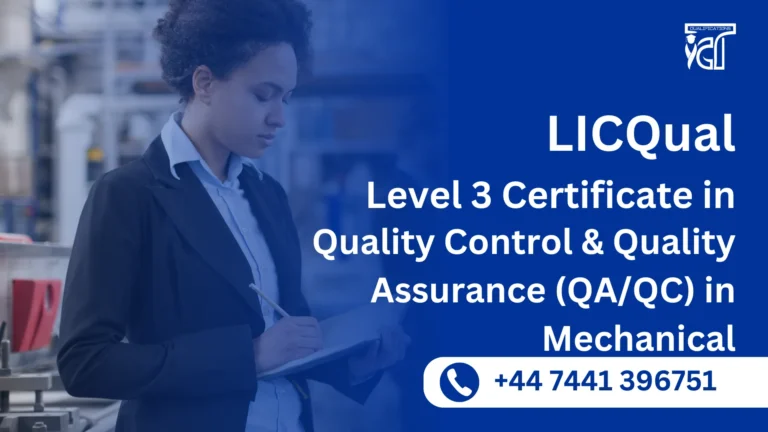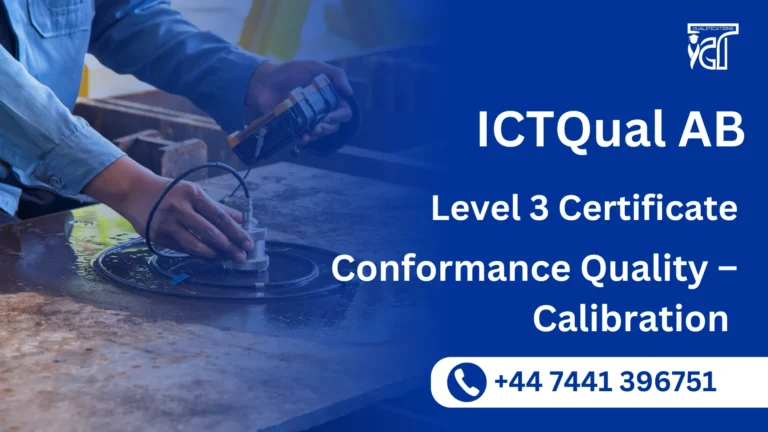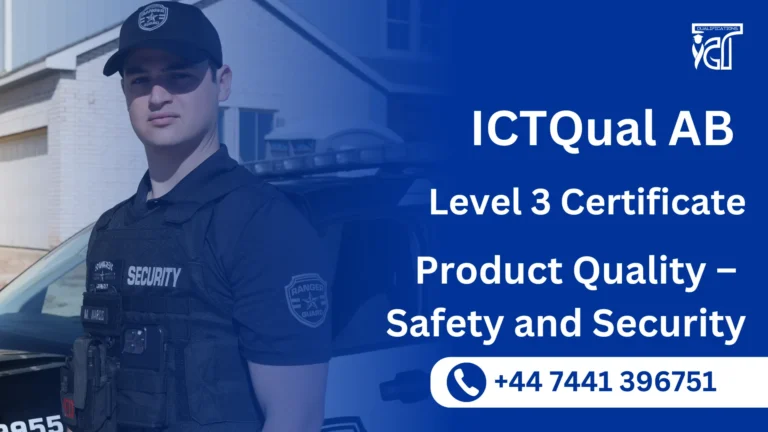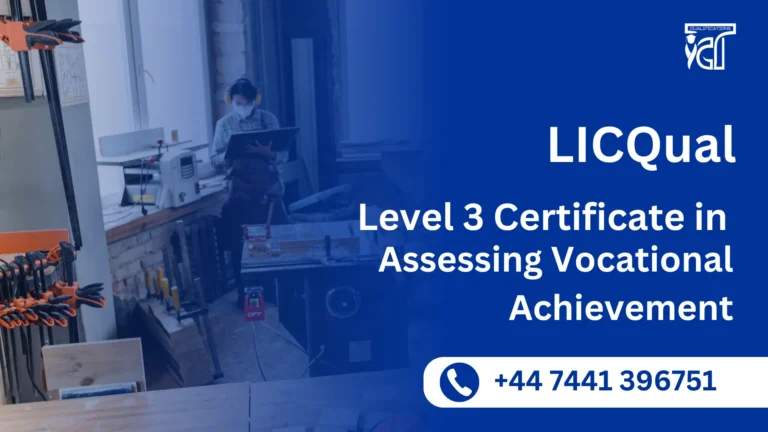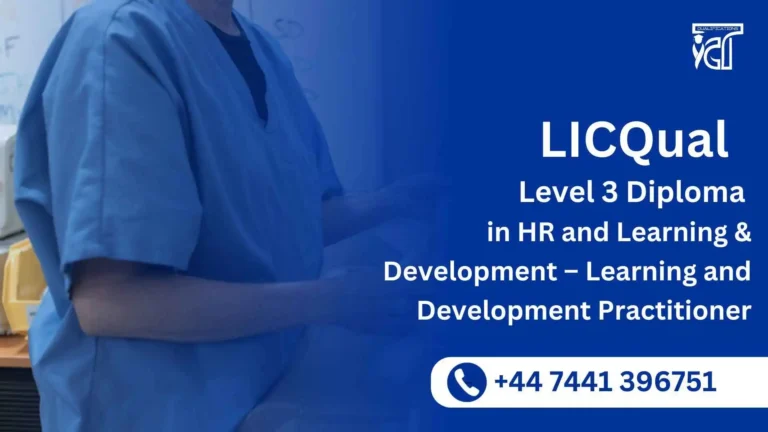ProQual Level 3 NVQ Diploma in Testing, Inspecting, and Thorough Examination Occupations (Construction) offers the ideal qualification to enhance your skills and expertise. This Ofqual-regulated qualification provides you with the necessary competencies to conduct thorough testing and inspections in the construction sector, ensuring the safety, quality, and compliance of various construction projects.
The ProQual Level 3 NVQ Diploma in Testing, Inspecting, and Thorough Examination Occupations (Construction) is designed for individuals working in construction who are responsible for carrying out inspections and testing in various construction projects. This qualification equips learners with the skills and knowledge necessary to ensure the integrity and safety of building structures, electrical systems, plumbing, and other key elements of construction.
As an Ofqual-regulated qualification, the Level 3 NVQ Diploma ensures that the training and assessment meet high standards of quality and are recognized across the UK and internationally. The course is entirely assignment-based, meaning that learners demonstrate their competencies through real-world assessments that reflect the tasks and challenges they will encounter in the workplace.
The ProQual Level 3 NVQ Diploma focuses on the core skills and knowledge required for conducting testing, inspecting, and thorough examinations in the construction industry. The qualification is designed to provide learners with the competence to assess and inspect various construction elements, identify any issues, and ensure that everything complies with relevant regulations and safety standards.
The ProQual Level 3 NVQ Diploma in Testing, Inspecting, and Thorough Examination Occupations (Construction) is an essential qualification for professionals looking to enhance their skills in the testing and inspection sectors of the construction industry. This Ofqual-regulated and assignment-based qualification ensures that learners acquire the practical skills and theoretical knowledge needed to excel in roles related to construction testing, inspections, and compliance.
ProQual Level 3 NVQ Diploma in Testing, Inspecting and Thorough Examination Occupations (Construction)
The ProQual Level 3 NVQ Diploma in Testing, Inspecting and Thorough Examination Occupations (Construction), To achieve the qualification candidates must complete ALL of the Mandatory units, plus the Mandatory unit(s) for ONE of the Pathways.
Mandatory Units
Mandatory Units – Complete All Units:
| Unit Title | Level |
|---|---|
| Confirming work activities and resources for an occupational area in the workplace | 3 |
| Developing and maintaining good occupational working relationships in the workplace | 5 |
| Confirming the occupational method of work in the workplace | 3 |
| Pathway 1 – Testing, Inspecting and thorough Examination of Plant, Machinery, Equipment or Accessories | |
| Unit Title | Level |
| Inspecting plant or machinery for operational serviceability in the workplace | 2 |
| Carrying out specific tests on plant or machinery to determine operational serviceability in the workplace | 3 |
| Pathway 2 – Leak Detection in Waterproof Systems | |
| Unit Title | Level |
| Detecting breaches in waterproofing systems using non- destructive leak detection in the workplace | 3 |
| Pathway 3 – Dynamic Pile Testing ( Mandatory Unit – complete this unit) | |
| Unit Title | Level |
| Dynamic load and integrity testing of piles in the workplace | 3 |
GLH (Guided Learning Hours) and TQT (Total Qualification Time) are terms commonly used in vocational qualifications to help define the amount of time a learner is expected to spend on their studies.
1. GLH (Guided Learning Hours)
GLH refers to the number of hours a learner spends being directly taught, supervised, or supported during their course. This includes the time spent in activities such as:
- Classroom instruction
- Practical workshops
- One-on-one tutoring or mentoring sessions
- Online learning sessions with tutor support
In other words, GLH represents the time that learners are actively engaged with their instructors or learning activities.
2. TQT (Total Qualification Time)
TQT represents the total amount of time a learner is expected to invest in completing a qualification, including:
- GLH (Guided Learning Hours): Time spent on direct learning, as explained above.
- Self-Directed Learning: This includes time spent on independent study, research, assignment completion, preparation for exams, and any other work the learner does outside of direct teaching hours.
TQT is a broader measure that includes all the time required to achieve the qualification. It helps learners and employers understand the overall commitment required for the qualification.
Key Differences Between GLH and TQT:
- GLH focuses on direct learning with guidance or supervision.
- TQT includes GLH as well as independent study time and other learning-related activities.
Example:
If a qualification has a TQT of 600 hours and a GLH of 250 hours, it means the learner should spend 250 hours in direct learning (classroom, online, or tutor-led sessions) and 350 hours on independent study or research.
ProQual Level 3 NVQ Diploma in Testing, Inspecting and Thorough Examination Occupations (Construction)
Confirming work activities and resources for an occupational work area in the workplace
- Identify work activities, assess required resources and plan the sequence of work.
- Obtain clarification and advice where the resources required are not available.
- Evaluate the work activities and the requirements of any significant external factors against the project requirements.
- Identify work activities which influence each other and make the best use of the resources available.
- Identify changed circumstances that require alterations to the work programme and justify them to decision makers.
Developing and maintaining good occupational working relationships in the workplace
- Develop, maintain and encourage working relationships to promote good will and trust.
- Inform relevant people about work activities in an appropriate level of detail, with the appropriate level of urgency.
- Offer advice and help to relevant people about work activities and encourage questions/requests for clarification and comments.
- Clarify proposals with relevant people and discuss alternative suggestions.
- Resolve differences of opinion in ways that minimise offence and maintain goodwill, trust and respect.
Confirming the occupational method of work in the workplace
- Assess available project data accurately to determine the occupational method of work.
- Obtain additional information from alternative sources in cases where the available project data is insufficient.
- Identify work methods that will make best use of resources and meet project, statutory and contractual requirements.
- Confirm and communicate the selected work method to relevant personnel.
Knowledge Application Task
Inspecting plant or machinery for operational serviceability in the workplace
- Interpret the given information relating to the work and resources when inspecting plant or machinery for operational serviceability.
- Know how to comply with relevant legislation and official guidance when inspecting plant or machinery for operational serviceability.
- Maintain safe and healthy working practices when inspecting plant or machinery for operational serviceability.
- Select the required quantity and quality of resources for the methods of work to inspect plant or machinery for operational serviceability.
- Minimise the risk of damage to the work and surrounding area when inspecting plant or machinery for operational serviceability.
- Complete the work within the allocated time when inspecting plant or machinery for operational serviceability.
- Comply with the given contract information to inspect plant or machinery for operational serviceability to the required specification.
Carrying out specific tests on plant or machinery to determine operational serviceability in the workplace
- Interpret the given information relating to the work and resources when carrying out specific tests on plant or machinery to determine operational serviceability
- Know how to comply with relevant legislation and official guidance when carrying out specific tests on plant or machinery to determine operational serviceability.
- Maintain safe and healthy working practices when carrying out specific tests on plant or machinery to determine operational serviceability.
- Select the required quantity and quality of resources for the methods of work to carry out specific tests on plant or machinery to determine operational serviceability.
- Minimise the risk of damage to the work and surrounding area when carrying out specific tests on plant or machinery to determine operational serviceability.
- Complete the work within the allocated time when carrying out specific tests on plant or machinery to determine operational serviceability.
- Comply with the given contract information to carry out specific tests on plant or machinery to determine operational serviceability to the required specification.
Detecting breaches in waterproofing systems using non-destructive leak detection in the workplace
- Interpret the given information relating to the work and resources when detecting breaches in waterproofing systems using non-destructive leak detection.
- Know how to comply with relevant legislation and official guidance when detecting breaches in waterproofing systems using non-destructive leak detection.
- Maintain safe and healthy working practices when detecting breaches in waterproofing systems using non-destructive leak detection.
- Select the required quantity and quality of resources for the methods of work when detecting breaches in waterproofing systems using non-destructive leak detection.
- Minimise the risk of damage to the work and surrounding area when detecting breaches in waterproofing systems using nondestructive leak detection.
- Complete the work within the allocated time when detecting breaches in waterproofing systems using non-destructive leak detection.
- Comply with the given contract information when detecting breaches in waterproofing systems using non-destructive leak detection.
Dynamic Load and Integrity Testing of Piles in the workplace
- Interpret the given information relating to the work and resources when dynamic load and integrity testing piles.
- Know how to comply with relevant legislation and official guidance when dynamic load and integrity testing piles.
- Maintain safe and healthy working practices when dynamic load and integrity testing piles.
- Select the required quantity and quality of resources for the methods of work to dynamic load and integrity test piles.
- Minimise the risk of damage to the work and surrounding area when dynamic load and integrity testing piles.
- Complete the work within the allocated time when dynamic load and integrity testing piles.
- Comply with the given contract information to dynamic load and integrity test piles to the required specification.
Benefits of the ProQual Level 3 NVQ Diploma in Testing, Inspecting, and Thorough Examination Occupations (Construction)
The ProQual Level 3 NVQ Diploma in Testing, Inspecting, and Thorough Examination Occupations (Construction) offers numerous benefits for both learners and employers. Here’s how this qualification can help you advance in your career:
1. Ofqual-Regulated Qualification
- As an Ofqual-regulated qualification, this diploma meets the highest educational standards and is recognized across the UK and internationally. Employers will trust that you have received training that meets stringent industry requirements.
2. Globally Recognized
- This qualification is accepted worldwide, allowing you to work in various countries, enhancing your career mobility and opportunities in the global construction sector.
3. Improved Career Opportunities
- Completing this qualification opens the door to a range of job opportunities within the construction industry, including roles as a construction inspector, quality control officer, and test engineer. This diploma is ideal for those looking to advance in specialized testing and inspection roles.
4. Practical, Real-World Learning
- The assignment-based nature of the course ensures that you demonstrate your skills through real-world scenarios. This practical approach allows you to apply your learning directly to your job, making it highly relevant and useful in your day-to-day work.
5. Enhanced Knowledge of Health and Safety
- One of the key components of the qualification is understanding and applying health and safety regulations. This will help you maintain a safe working environment, reduce risks, and ensure compliance with safety standards—vital skills in the construction industry.
6. Development of Regulatory Compliance Expertise
- The course covers important regulatory and industry standards that you will need to adhere to in inspection and testing. This expertise makes you a valuable asset to employers who need to ensure that their projects meet all legal and safety requirements.
7. Career Advancement
- The qualification enhances your professional credibility, enabling you to progress to more senior roles within the construction industry, such as senior inspector, site manager, or quality assurance specialist. It helps you stand out in a competitive job market.
8. Flexibility and Accessibility
- The assignment-based structure allows for flexible learning, making it easier for you to study while balancing other work or personal commitments. This flexible approach also ensures you can learn at your own pace, which is ideal for those working in full-time jobs.
9. Focus on Key Skills
- Through this diploma, you will acquire valuable skills, such as effective inspection techniques, the ability to perform tests, create detailed reports, and communicate findings clearly to stakeholders. These skills are highly valued by employers in the construction sector.
10. Competence in Conducting Thorough Examinations
- You will develop the skills to conduct thorough and detailed examinations of construction systems, structures, and installations, ensuring that all aspects of a project meet safety standards and are in optimal working condition.
11. Increased Earning Potential
- With specialized skills in construction testing, inspecting, and compliance, you may be able to command higher salaries and better job offers compared to individuals without this qualification.
12. Continuous Professional Development (CPD)
- This diploma contributes to your CPD, allowing you to stay updated with the latest industry practices, testing methods, and regulatory changes. Ongoing development can be essential for maintaining a competitive edge in the industry.
13. Industry-Relevant Learning
- The content and assessment of the course are aligned with current industry standards, ensuring that what you learn is directly applicable to the construction industry’s evolving demands.
The ProQual Level 3 NVQ Diploma in Testing, Inspecting, and Thorough Examination Occupations (Construction) is ideal for a variety of professionals working in or aiming to pursue roles in the construction industry. It’s specifically designed for individuals who are responsible for inspecting and testing construction projects to ensure safety, quality, and compliance. Here’s who will benefit most from this course:
1. Construction Inspectors
- Individuals who are already working as construction inspectors or aspire to take on this role will find this qualification essential. It helps you gain the practical and theoretical knowledge required to inspect various construction systems, such as electrical, mechanical, plumbing, and structural elements.
2. Test Engineers
- Professionals who specialize in testing the functionality and safety of construction systems will find this qualification highly relevant. The course equips you with the skills to conduct thorough tests and assessments, ensuring that all aspects of construction meet required safety and regulatory standards.
3. Quality Control and Assurance Professionals
- Those working in construction quality control, including quality assurance professionals, can enhance their expertise by completing this diploma. It provides the tools to assess, report, and ensure that construction projects comply with safety regulations and quality standards.
4. Construction Supervisors and Site Managers
- Supervisors and managers who oversee construction sites and teams will benefit from this qualification. It provides the knowledge to effectively monitor, inspect, and ensure compliance with safety and regulatory standards across construction projects.
5. Plumbers, Electricians, and Mechanical Technicians
- Tradespeople who are involved in the installation and maintenance of plumbing, electrical, and mechanical systems in construction will find this course useful to enhance their inspection and testing skills. It can help you gain a deeper understanding of regulatory requirements and how to ensure system safety and efficiency.
6. Health and Safety Officers
- Health and safety professionals working in construction environments can use this qualification to broaden their understanding of the testing and inspection processes and learn how to ensure compliance with safety regulations at every stage of a construction project.
7. Aspiring Construction Inspectors
- If you’re looking to break into the field of construction inspection and testing, this qualification offers a clear pathway. It helps you build a solid foundation of knowledge and practical experience, making you a qualified candidate for roles in the construction inspection and testing sector.
8. Contractors and Subcontractors
- Contractors and subcontractors working on construction projects who are responsible for the integrity of construction systems will benefit from this qualification. It enables them to better manage inspection, testing, and thorough examination tasks, ensuring projects meet regulatory and safety standards.
9. Professionals Looking to Up-skill
- Individuals who are already working in a construction-related role and are looking to upskill and move into inspection, testing, or quality assurance will find this diploma highly beneficial. It equips you with specialized knowledge and practical skills for career advancement.
10. Project Managers in Construction
- Project managers who are responsible for overseeing the quality, safety, and compliance aspects of construction projects will find this qualification crucial for their professional development. It helps them understand the inspection and testing processes needed to ensure projects meet required standards.
Entry Requirements
Register Now
Qualification Process
Qualification Process for the ProQual Level 3 NVQ Diploma in Testing, Inspecting and Thorough Examination Occupations (Construction)
- Self-Assessment:
Begin by evaluating your eligibility to ensure you meet the qualification requirements, including work experience, knowledge, and language proficiency. - Registration:
Complete your registration by submitting the required documents, including a scanned copy of a valid ID, and paying the registration fee. - Induction:
An assessor will conduct an induction to confirm your eligibility for the course and explain the evidence requirements. If you do not meet the criteria, your registration will be canceled, and the fee will be refunded. - Assignmnets & Evidence Submission:
Provide all assignmnets and the necessary evidence based on the assessment criteria outlined in the course. If you are unsure of the required evidence, consult with the assessor for guidance on the type and nature of evidence needed. - Feedback and Revision:
The assessor will review your submitted evidence and provide feedback. Evidence that meets the criteria will be marked as “Criteria Met,” while any gaps will be identified. You will be asked to revise and resubmit if needed. - Competence Evidence:
Submit final evidence demonstrating that all learning outcomes have been met. This evidence will be marked as “Criteria Met” by the assessor once it is satisfactory. - Internal Quality Assurance (IQA):
The Internal Quality Assurance Verifier (IQA) will review your evidence to ensure consistency, quality, and compliance with standards. - External Verification:
The IQA will submit your portfolio to ProQual’s External Quality Assurance Verifiers (EQA) for final confirmation. The EQA may contact you directly to verify the authenticity of your evidence. - Certification:
Upon successful completion of all checks, ProQual will issue your official certificate, confirming that you have attained the ProQual Level 3 NVQ Diploma in Testing, Inspecting and Thorough Examination Occupations (Construction).


